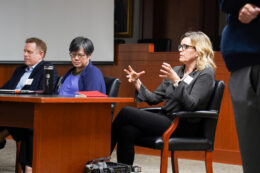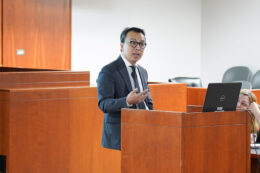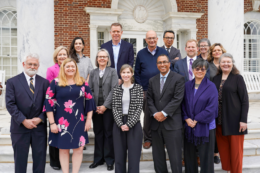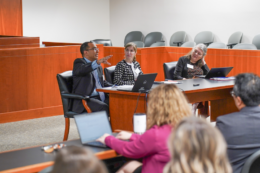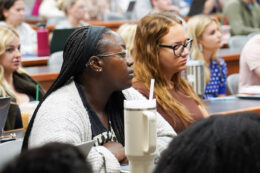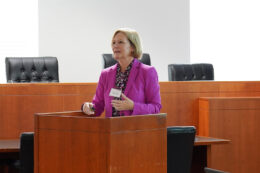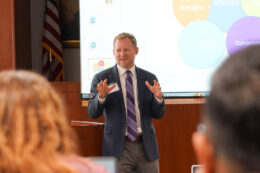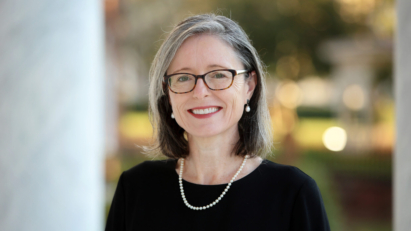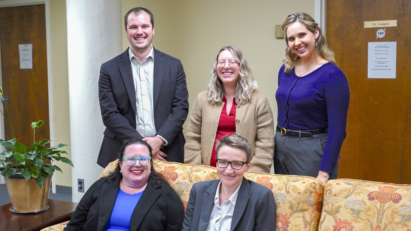Professional Identity Formation Symposium 2024
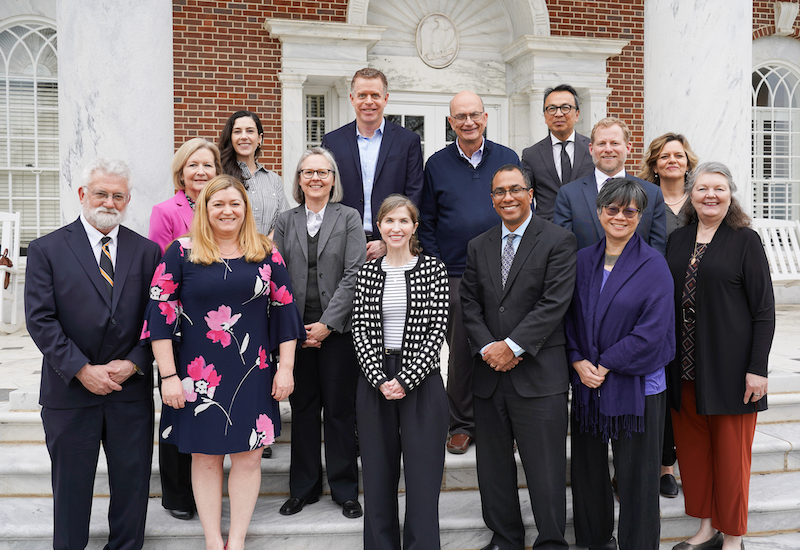
On March 8, 2024, Mercer University Law School and the Mercer Center for Legal Ethics and Professionalism hosted a symposium on “Current Issues in Professional Identity Formation.” The Mercer Law Review will publish the articles that emerge from the event.
The symposium was the 24th annual Georgia symposium on professionalism and ethics. The series is funded by an endowment that resulted from the settlement of charges of litigation misconduct in a civil case in the United States District Court for the Middle District of Georgia in the 1990’s. That same settlement endowed professorial chairs in ethics and professionalism at Mercer, the University of Georgia, Emory University, and Georgia State. The annual symposium rotates among those four schools.
The night before the symposium, Professor Tim Floyd gave the opening address. Professor Floyd reviewed the history of the Professional Identity Formation movement and discussed why it is so important for law schools to share what they are doing to help students form the right kind of professional identity.
Mercer’s 2024 symposium had four main presenters, each of whom was followed by two commentators.
David Grenardo of the University of St. Thomas School of Law presented on “How Law Schools Can Help Historically Underrepresented Students Develop Their Professional Identities.” Women, people of color, first gen college and first gen law students, and individuals from the LGBTQIA+ group may have a harder time with their professional identity formation, particularly if they do not have family members, role models, and/or mentors who are lawyers. When you add in structural and institutional racism, sexism, and other forms of discrimination, bias, and prejudice that are a part of the legal system, it makes it that much more difficult for historically underrepresented individuals to know where and how they will fit in as lawyers. David’s presentation focused on what law schools can do for these students as they develop their professional identities.
The commentators for David’s presentation were Barbara Glesner Fines from UMKC School of Law and Janice Craft from the University of Richmond School of Law.
Dean Daisy Floyd from Mercer Law spoke on “The Role of Purpose in Professional Identity.” In Educating Lawyers, the Carnegie Report describes the apprenticeship of “identity and purpose” to emphasize the importance of grounding legal education—and the student’s emerging professional identity as a lawyer—in the public purposes of the profession. During the 1950’s, social scientists began to study the role of meaning and purpose in a person’s life, and the advent of positive psychology in the early 2000’s spurred an emerging body of empirical research on the importance of purpose to a fulfilled and meaningful life. This presentation addressed what lessons legal educators can learn from purpose studies to inform our work on the formation of professional identity.
Ken Townsend from Wake Forest Law and Harmony Decosimo from Suffolk Law School were Dean Floyd’s commentators.
Kendall Kerew from Georgia State College of Law chose as her topic, “The Rule of Law, the Role of the Public Citizen, and Professional Identity Formation.” The Preamble of the Model Rules of Professional Conduct defines a lawyer as “a representative of clients, an officer of the legal system and a public citizen having special responsibility for the quality of justice,” and charges lawyers as “public citizens” to “seek improvement of the law, access to the legal system, the administration of justice and the quality of service rendered by the legal profession” while also “further[ing] the public’s understanding of and confidence in the rule of law and justice system. . . .” This presentation explored the intersection of the Preamble’s definition of lawyer with the intentional exploration of law student professional identity formation and training on cross-cultural competence, racism, and bias required by ABA Standards 303(b)(3) and 303(c) as a means to help students discern their role as future lawyers and empower students in their duties to protect the rule of law as the foundation of democracy, provide access to justice, and make change where the law has created injustice.
Kendall’s commentators were Eduardo Capulong from CUNY School of Law and Kelly Terry from University of Arkansas Little Rock (UALR) William H. Bowen School of Law.
Finally, Aric Short from Texas A&M University School of Law spoke on “Beyond Fiduciary Duties: Developing Discernment to Navigate Conflict in Law Student Professional Identity Formation.” The concept of lawyer as fiduciary is deeply rooted in what it means to be an attorney—it’s integral to our professional identity. Aric’s presentation and paper explored the concept of the lawyer as fiduciary, including how that label affects well-being messaging and programming in law schools. Aric identified predictable conflicts that can arise for legal professionals in the areas of values, duties, and priorities and explored how we can more effectively guide students to develop effective skills of discernment to better prepare them for these professional conflicts.
Carwina Weng from LSAC and Lindsey Gustafson from UALR William H. Bowen School of Law provided the commentary on Aric’s presentation.
